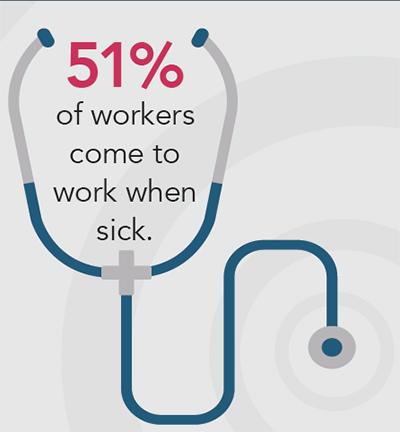Food Safety Danger: More Than Half of Employees Go to Work Sick

Today the Center for Research and Public Policy (CRPP) released a survey that highlights several key findings related to how frontline food workers operate and approach their jobs. Commissioned by Alchemy Systems, the annual “Mind of the Food Worker” survey revealed enthusiasm on the part of these employees to continue to grow and move up the ranks within their organizations while also underscoring what has become an increasing problem across all U.S. industries—the fact that employees still show up to work when they’re ill.
“Leadership doesn’t believe that people go to work when they’re sick,” Holly Mockus, product manager at Alchemy, told Food Safety Tech. “If people are sick, they should stay home. Not only are we talking about [infecting] people who you’re working with, but we’re also talking about foodborne illnesses that can be transmitted into food.” Employees go into work when they’re sick for a variety of reasons: They don’t want to let their fellow coworkers down (46% provided this response in the survey); they feel peer pressure as a result of staff shortage; or they feel they simply don’t have a choice due to attendance policies and can’t afford to lose pay (more than 45% of respondents gave this answer). “As an industry we have to take a look at the policies and procedures, along with the way that we’re staffing, and see what we can do to alleviate this [issue]”, says Mockus.
Good News on the Frontlines
When confronted with a food safety or product issue, 93% of respondents said they had the confidence to stop working. “The industry has made the paradigm shift that we’ve all been striving so hard to achieve over the last several years,” says Mockus. “The fact that [food workers] understand their role, food safety and workplace safety, and are willing to take responsibility to ensure they stop something that is going awry—that was a very positive thing to come out of the survey.”
The other area of optimism on the frontlines concerns the enthusiasm of workers in improving performance—67% of respondents expressed an interest in being involved in the development of training. This response indicates a movement towards more proactive employees who want to be part of the solution and make a difference. The key takeaway here is for corporate leadership to leverage the institutional knowledge that these in-house frontline workers have to further improve the business and how it operates.
“The food industry needs to take a step back and stop thinking about their workers as hourly workers and instead as an asset to the business,” says Tara Guthrie, communications at Alchemy. “Right now they’re not traditionally viewed as human capital in a corporate world, but they could be a big asset and have a big impact on the bottom line.”
How Employees Learn: A Shift in Mindset
Millennials and the reliance on technology have changed how employees learn and operate in the workplace. Within the leadership survey results, nearly 33% of respondents are making changes to adjust to how millennial employees learn. “Traditional management style doesn’t always work well with millennials,” says Mockus. This particular generation is also more in tune with using technology to communicate—even when they are sitting across from each other. Mockus indicates that leadership needs to clearly communicate to millennials the importance of understanding their role within their organizations, especially from a day-to-day operation level, as well as present information in a manner that captures their attention, allows them to retain the information, and enables them to put it into practice every day. This strategy should also extend to other generations of frontline workers. “I think all of us have become accustomed to having immediate information that is encapsulated and contained within a few words,” says Mockus. “We are so used to scanning information and moving on. We have to keep in mind that the way in which people are learning, retaining information and using it is changing. Companies that work toward accommodating those millennials will also be doing a good service for the rest of the adults in the workforce.”
The survey polled more than 1200 food employees working within production, processing, and distribution—from farms and ranches to slaughterhouses and food processing plants to commercial bakeries, retailers and distributors. It was conducted earlier this summer, and employees were located in the United States and Canada. One of the goals of the survey is to give the industry active takeaways to further drive safety in the food supply. “We are trying to understand the food workers because they’re such an important part of the whole supply chain,” says Mockus. “They are the most important ingredient in every product that is produced.”
For more key findings, view the Mind of the Food Worker survey.
Next month’s Food Safety Consortium conference will address issues related to employee training, Food Safety Culture, compliance and much more. Register here. The event takes place November 17-20 in Schaumburg, IL.